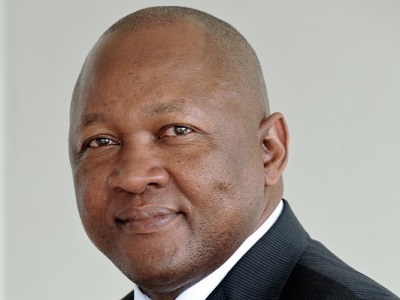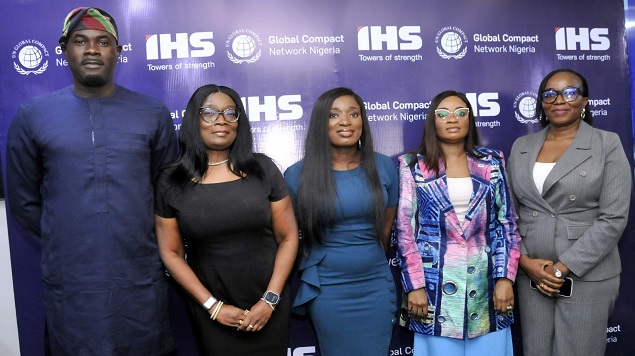General News
Convergence Partners Accelerates ICT Development via Infrastructure Fund

Convergence Partners – an investment management firm focused on the telecommunications, media and technology sector in Africa yesterday announced the launch of the Convergence Partners Communications Infrastructure Fund (CPCIF), the only infrastructure fund that is dedicated solely to the information and communications technology (ICT) sector in Africa.
With a first close of $145 million, it is one of the largest African based infrastructure funds, notwithstanding its single sector focus.
CPCIF, which has a targeted final close of $250 million, aims to invest in communications infrastructure and related services and technologies across sub-Saharan Africa, with a clear focus on future investments and development in West Africa.
Convergence Partners further plans to set up a West African office within the next year. The Fund expects to generate significant returns for investors, while also enabling ICT-driven socio-economic development.
CPCIF reached its first close with capital commitments from the following investors: Convergence Partners (as sponsors), the International Finance Corporation (IFC), the European Investment Bank (EIB), the Dutch Development Bank (FMO), the Development Bank of Southern Africa (DBSA) and the CDC Group (CDC).
“As specialist ICT investors and innovators, Convergence Partners is dedicated to accelerating investment capital, digital access and ICT infrastructure development on the continent,” said Andile Ngcaba, chairman of Convergence Partners.
“As a result, we focus strongly on initiatives that increase the availability of communications, broadband services and new technology offerings to African people. The launch of this Fund will enable us to achieve these objectives on a greater scale.”
The African ICT sector has seen significant growth and is a catalyst for economic development.
According to a recent McKinsey report, increased use of the Internet in Africa could result in a contribution of $300 billion a year to the continent’s gross domestic product (GDP) by 2025.
However, the infrastructure to deliver these services remains significantly underdeveloped. The upgrading, management and ownership of existing and new infrastructure by specialist owners with private capital provides the investment opportunity for CPCIF to achieve its financial and developmental goals.
Convergence Partners’ founders are seasoned pan-African private equity players, experienced in developing value-add investments that deliver shareholder returns whilst underpinning continental transformation.
Convergence Partners has invested in various landmark African transactions, which have brought cost effective broadband services to underserved African markets.
The Fund is committed to facilitating regional ICT infrastructure and integration, ultimately fostering the advancement of a sustainable and more prosperous Africa.
General News
NASRDA, Galaxy Space Firm Sign MoU on Satellite Connectivity

National Space Research and Development Agency (NASRDA) has signed a Memorandum of Understanding (MoU) with Galaxy Space, Chinese LEO satellite player, to deploy direct‑to‑device (D2D) satellite services nationwide by the end of this year.

According to media reports, Galaxy Space will integrate its LEO satellite constellation into Nigeria’s telecom grid, which will allow existing smartphones and laptops to link directly to the satellites.
The MoU also covers technology‑transfer programmes, joint R&D labs and the co‑production of a CubeSat by Nigerian engineers.
Apart from the benefit of enabling mobile coverage outside of terrestrial network range, Dr Matthew Adepoju, director- general, NASRDA, said the deal with GalaxySpace would enable Nigeria to build up its domestic space technology sector.
“It is no longer acceptable that we must import every single device we need,” he told the News Agency of Nigera. “The time has come for us to produce our own technologies here at home.”
GalaxySpace, which designs and manufactures its own LEO satellites, currently has a test constellation of seven LEO satellites in orbit, and has said its “Mini-Spider” constellation will eventually comprise up to 1,000 satellites.
GalaxySpace said it has also signed multi-tier partnerships in Thailand, the United Arab Emirates, Saudi Arabia, Indonesia, and Malaysia.
Last year, it also signed a deal with Hong Kong carrier PCCW Global to integrate its LEOsat connectivity with PCCW’s worldwide network, giving it access to over 3,000 cities across the Americas, Europe, Africa, the Middle East and Asia-Pacific.
General News
IHS Nigeria, United Nations Global Compact Host High-Level Dialogue on Sustainability and Greener Business Practices in Nigeria

IHS Nigeria, in collaboration with the United Nations Global Compact Network Nigeria, hosted a high-level private sector dialogue themed “Collaborative Strategies for Greener Business Practices, Innovation and Sustainable Development”.

The event, held in Lagos, brought together key players from different sectors including finance, law, telecommunications, biodiversity, and corporate sustainability to explore actionable pathways to achieve meaningful environmental stewardship in Nigeria.
The panel session offered bold perspectives on integrating sustainability into business frameworks across different sectors, whilst dispelling myths, and highlighting opportunities for organizations, and calling for collective action from all players within the business value chain.
Delivering a keynote address, Titilope Oguntuga, Director, Sustainability at IHS Nigeria, emphasized the urgency of environmental consciousness: “Sustainability is not a destination — it’s a collective journey.
“It requires courage to transform, vision to lead, and collaboration to scale. Nigeria stands at a crossroads. We can either be overwhelmed by the risks or rise to become a beacon of green innovation and inclusive growth in Africa. The choice is ours — and the time is now.”
Sylvie Josel, Lead, Biodiversity and Nature-Based Solutions at the United Nations Global Compact, joined virtually from New York and spotlighted nature as a strategic asset:
“Nature must no longer be treated as an afterthought. It underpins everything, from human rights to supply chains. Embedding biodiversity into a company’s core strategy isn’t just a risk mitigation measure; it’s a smart, future-forward business imperative”.
Lanre Babalola, Group Head, Climate Finance and Sustainability at the Bank of Industry (BOI), provided insights into how BOI is funding sustainable ventures and driving innovation: “We look beyond profitability; we look at environmental and social impact. Whether it’s plastic roads, biogas, or solar transitions, we support businesses that are not only bankable but capable of reshaping the future.”
From the legal perspective, Oyeronke Oyetunde, General Manager, Regulatory Affairs, MTN Group, drew attention to the regulatory challenges hindering sustainability adoption: “Our legal frameworks are trailing behind today’s sustainability realities. We need forward-thinking laws, reduced regulatory silos, and incentives that reward the right behavior. Sustainability can’t thrive where enforcement is weak, and taxation is excessive.”
Abimbola Agbejule, Head, Corporate Sustainability and Responsibility at Wema bank, spoke passionately about inclusiveness in sustainable development: “You don’t need to start big to make impact. MSMEs make up a huge part of our economy. Sustainability should be embedded in their day-to-day activities, and we must democratize access to knowledge, tools, and partnerships.”
The session was moderated by Gloria Okorie, Head of Programs at the United Nations Global Impact Center.
The event closed with a resounding call to action for stronger legal frameworks, deeper collaborations, and inclusive capacity building across sectors. The event further reinforces IHS Nigeria’s position as a leader in corporate sustainability and innovation in Nigeria.
“At IHS Nigeria, we recognize that true progress happens when sustainability is not an obligation, but a culture, lived every day, across every unit,” Titilope Oguntuga added.
Through initiatives like this dialogue, IHS Nigeria and its partners continue to champion solutions that protect the planet, empower people, and ensure long-term business viability.
General News
Bridging the Digital Divide: Over 700 Young Africans Empowered by Paradigm Initiative

Paradigm Initiative (PIN), a leading digital rights and inclusion nonprofit, has revealed in its 2024 Annual Impact Report that over 707 young individuals across 11 African countries have been empowered through its flagship LIFE Legacy Programme.

The initiative delivers training in life skills, ICT, financial literacy, and entrepreneurship—transforming underserved communities across the continent.
In 2024, the LIFE Legacy Programme ran 25 training cohorts across Cameroon, DRC, Ghana, Kenya, Senegal, South Sudan, Liberia, Uganda, Tanzania, Zambia, and Zimbabwe. In Senegal, 60 laptops were distributed to local partners, while digital literacy programmes were launched in schools in Cameroon and Tanzania through the LIFE@School initiative.
PIN advanced its advocacy by supporting 29 legal cases in Ghana, Kenya, and Nigeria. A notable success was the landmark judgment in Molehin v. UBA, where the bank was found guilty of violating data privacy laws.
PIN’s research and media efforts made powerful waves. The Londa digital rights report, covering 26 countries, was downloaded 8,457 times. Its fourth short film, Undersight, recorded nearly one million views on YouTube. PIN also developed an AI strategy report with TrustLaw and collaborated with the Centre for Democratic Technology to assess content moderation policies for Kiswahili across Kenya and Tanzania. A separate report highlighted the troubling deployment of surveillance technologies across Africa, which was referenced in direct advocacy engagements with a telecom operator.
The organisation’s advocacy also contributed to the adoption of the African Commission’s Resolution 580, which urges governments to avoid Internet shutdowns during elections—strengthening digital freedom across the continent.
Meanwhile, the Digital Rights and Inclusion Forum (DRIF) convened in Accra attracted 1,004 delegates from 61 countries, strengthening regional collaboration and amplifying the voice of civil society. PIN’s strategic communications pushed its media reach to 1.43 billion and social media engagement to 8.8 million.
Alongside training and policy efforts, the organisation inspired young changemakers through youth-focused campaigns and hosted seven fellows under the Digital Rights and Inclusion Learning Lab (DRILL) fellowship.
Crowning a year of impact, PIN earned the maiden PrivCon Privacy Award in Nigeria and was recognised in the Social Innovation Category at the Nigeria Innovation Awards for its work connecting African youth to digital opportunity.

 News2 days ago
News2 days agoLasaco Assurance to Invest in Technologies, Systems to Deliver Value to Clients

 E-Financial2 days ago
E-Financial2 days agoNIBSS National Payment Stack to Transform Nigerian Instant Payments

 E-Financial2 days ago
E-Financial2 days agoCBN Reaffirms Banking Sector Resilience as Forbearance Ends

 News1 day ago
News1 day agoPalmPay, Glo Launch “Recharge and Win Bonanza 2” with Exciting Prizes

 General News1 day ago
General News1 day agoBridging the Digital Divide: Over 700 Young Africans Empowered by Paradigm Initiative

 General News1 day ago
General News1 day agoIHS Nigeria, United Nations Global Compact Host High-Level Dialogue on Sustainability and Greener Business Practices in Nigeria

 News1 day ago
News1 day agoHow and Why N210 Trillion is Missing in NNPCL – CFO

 General News2 days ago
General News2 days agoMoniepoint Demonstrates Commitment to Nurturing Africa’s Future Leaders


























